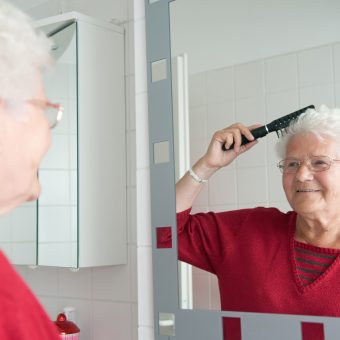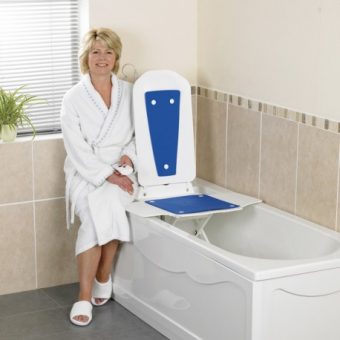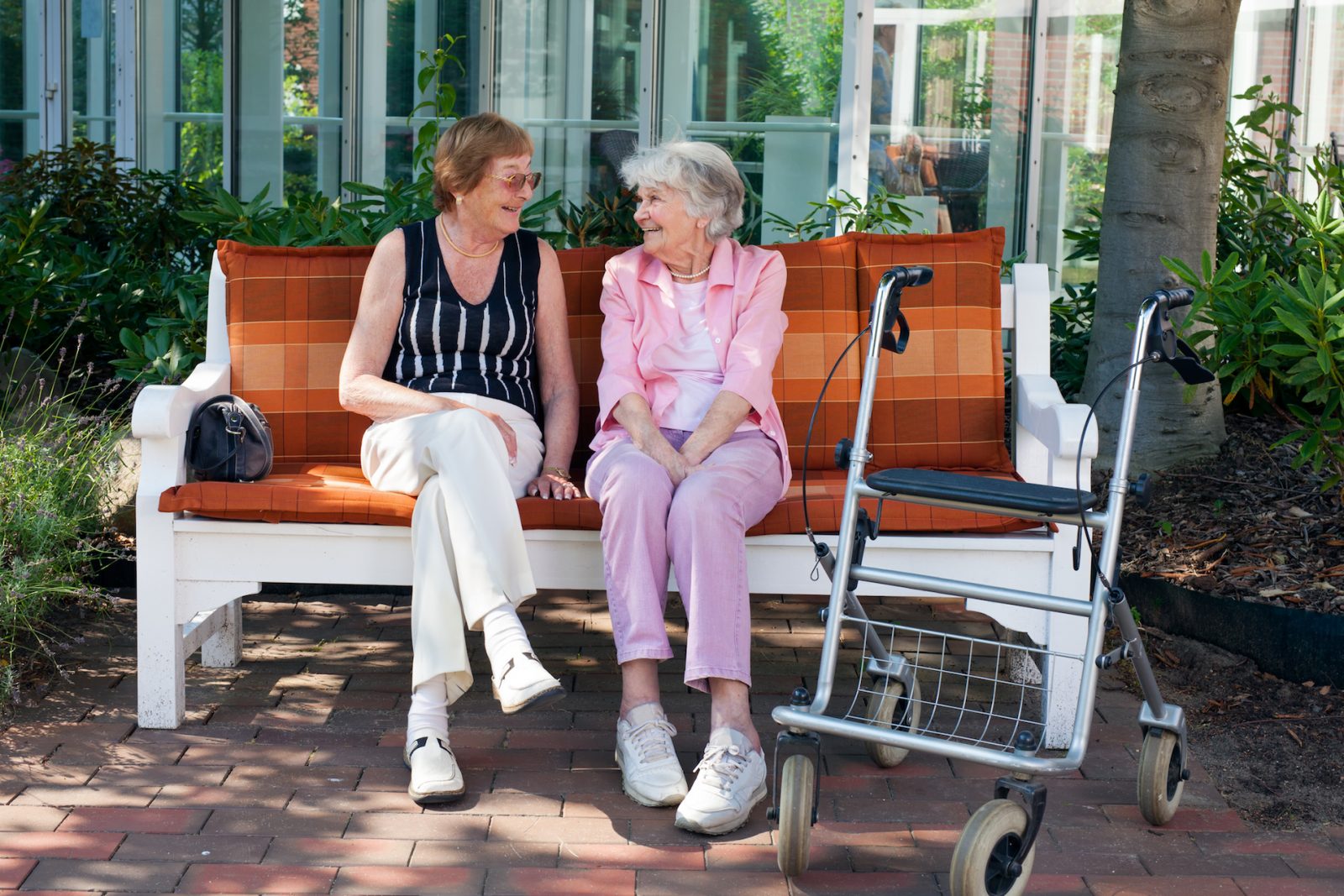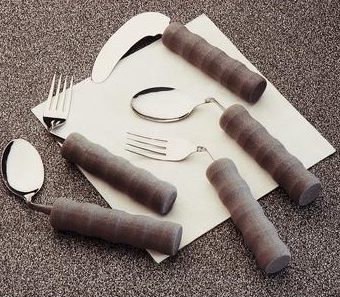Parkinsons Disease
5 Tools to Help with Parkinsons Disease
5 Tools to help with Parkinsons Disease
Parkinsons Disease doesn’t necessarily affect the elderly it can also affect the younger generation too! But regardless of age Parkinson’s can prevent you from undertaking some basic tasks. Tasks like eating, drinking, using the bathroom, and the list could go on.
At the Aged Care Store we like to educate families on products that are available to help make life a little bit easier. We want to help make simple tasks simple again. So here are 5 tools that we hope will help the carer and those living with Parkinson’s Disease.
1. Let’s talk Scoop Plates!
A Scoop Plate is simply a plate that has a lip and the inside of Plate has a slight slope. The sloping bottom and the high lip helps to prevent the food from spilling over the edge when trying to scoop up food with one hand.
The plate is perfect for anyone that struggles to pick up food with utensils or for those who can only use one hand. Most have a non-slip base to prevent the plate from moving whilst pushing the spoon.
There are also incurve plate surrounds that are placed around existing plates. These are great because they will fit most plates. This will save you from having to buy a brand new plate. Also great if you are eating out. But make sure you take a plastic bag to put it into after you use it.
2. Keeping Your Loved One In Bed!
Sometimes just trying to keep our loved ones in bed can be hard. One way to prevent a fall from bed is by using a bed rail. We have rails to suit both single and double beds. This way both the patient and the carer will get a great nights sleep, with peace of mind.
Bed ladders are also a great way to help your loved one sit up. We are certainly not suggesting that you put a ladder next to the bed! It’s a rope in the shape of a ladder. The rope is positioned at the bottom of the bed and comes up to the top of the bed. It just lays over the existing bedding (but secured at the bottom of the bed). The patient can then use this to pull themselves up; provided of course that they have the correct upper body strength.
Grip Mats have a bigger purpose than opening jars. If you are struggling to keep plates, cutting boards still, or you have stability issues when standing. Then our Dycem Grip Mats can change your life for the better. They are also great when placed on the footrests of wheelchairs; they will prevent the feet from slipping off. If you need something to hold your pillow in place when sitting up in bed, or a hospital bed; then place a Dycem Grip Mat underneath your pillow and voila your pillow will stay in place!
3. Making It Easy To Use Utensils!
In addition, to our Incurve Plates, we also have a series of utensils that can be used for people who have Parkinsons disease. Additionally, they will help anyone who suffers from hand tremors or just from a weak grip. The Spoons have a deep lip to help minimise spillage.
Angled Cutlery is perfect for anyone with limited arm, wrist movement, or finger movement. The handle of the knife is straight and built up, for a better grip. To help with cutting the knife blade is angled, giving a rocking motion. Whilst the spoons and forks have a curved built-up handle for a better grip.
One handed cutlery combines a few different cutlery functions. For example; the Fork, known as a Splayed Fork, is also designed for cutting food. In addition, it has a deep rounded body at the bottom of the fork area so that it can also act like a spoon.
Foam handles help to cushion a person’s hand grip. Some patients have a painful grip, so this will help soften the impact. These are available with angled cutlery too. Also, you can purchase Closed Cell Foam Tubing that goes over the handles of existing cutlery. This tubing can also be placed over pens, pencils, or toothbrushes.
Multi-Holders are great, made from a light stretchy fabric. This will securely hold a range of utensils, pencils brushes. Suitable for people with a weak grip.
4. Grooming Tools!
If you are a caregiver then you will know firsthand how difficult it is to maintain patient personal hygiene. Likewise, if you are someone living with Parkinson’s then you know quickly your dignity can be lost when just trying to undertake a task like showering or using the toilet.
Let’s sta
Now a Dressing Stick is usually a combination of a shoehorn at one end and at the other end, it will have useful hooks, and pushers. The dressing stick component is pretty awesome because it will have different types of angled hooks to help grab clothes and pull them up if they are slipping off. It’s equally as awesome for helping to pick up clothes too. If you have an itchy back then it can double as a back scratcher. Need help to turn the light switch off then this tool comes in handy for that too.
One handy invention is the long handled brushes and combs these are very handy because you don’t have to reach back as far. Perfect for anyone that has limited reach. You can also even get long handled sponges, which is perfect for patients who want to be able to wash their body themselves. This is great for washing between the toes, around the back of the body as well. Yes, there are even long handled bottom wipers available too. Everyone deserves the choice of whether they want help from others or whether they want to try themselves.
5. Using The Bathroom
Ok, so we have dressing sorted. But what help can we provide in the Bathroom for people living with Parkinsons Disease?
Toileting
Well for the toilet we have some useful tools such as raised toilet seats, toilet frames or a commode. Essentially the right one is going to depend on a few things, the space in the toilet and the type of help that you need. So if you are able to lower yourself down to the toilet and then stand up easy enough then maybe just a raised toilet seat would help you. These usually don’t have arm support.
If you are able to lower yourself down to the toilet and then stand up easy enough then maybe just a raised toilet seat would help you. These usually don’t have arm support, however, there are a few on the market that do have the addition of swing back arms which can really help patients with Parkinsons Disease.
If you have enough space then a toilet frame might help you, this is an independent frame that is placed around the toilet. Therefore you can continue to use your existing toilet seat – the frame will just help when sitting down and standing up, providing that much-needed support. Some of these frames will also have a toilet seat attached which means the seat will sit over your existing toilet seat. Please note that this means that there more than likely will be a gap between the toilet frame seat and the existing toilet seat. If investing in this option look for a splash guard option to help minimise mess and extra cleaning.
Now a Commode is its own frame with a bowl underneath. It really does work separate to the toilet. It will require a more effort to keep clean. But it’s a great option for those who have very limited mobility and can’t make it far from the bed. Our Shower Commodes are great for showering and as a toilet as well.
Showering Or Bathing
Everyone wants to be able to take a shower or have a soak in the bath; especially if our bodies are aching. S
For the bath we have bath lifts – if your budget can stretch this far, then this is a perfect option. The lift will literally lower you down into the water. Then at the push of a button you will start to rise out of the water. If your budget can’t stretch that far then don’t panic we have bath seats. They sit in the bath. But it has you sitting up a little higher in the bath; you will need a bit more water in the bath. If you have difficulty lowering yourself down and then getting up then you will need a bath grab rail. You are able to permanently fixed these to the wall. Adjustable rails that are not permanent and attach to the outer edge of the bath are also available.
For the shower we have shower stools and seats, again the type will depend on the individual needs. These are great because you can pull them in and out of the shower as you need. Allowing others that live in the house to shower too. Provided that the patient living with Parkinsons Disease (or patient) is able to sit by themselves then they will be able to enjoy a nice relaxing shower too!
Aged Care Store Disclaimer
The Aged Care Store recommends that you talk to your Medical Practitioner, Occupational Therapist or Case Worker before purchasing any daily living aid products to ascertain whether this product is suitable for you. If you start to feel pain or discomfort, you should stop immediately and also seek Medical Help. We care for you, so please use in accordance with the provided instructions. If you are unsure whether you loved one has Parkinsons Disease then we strongly recommend that you talk with your doctor.








